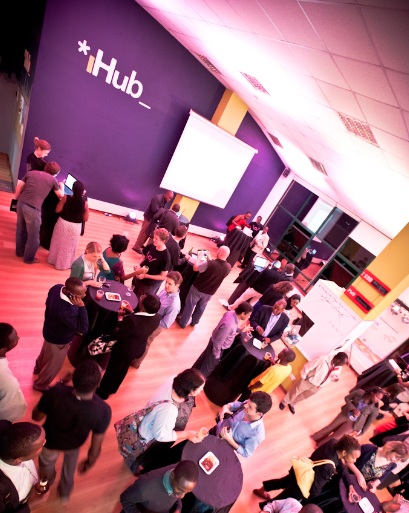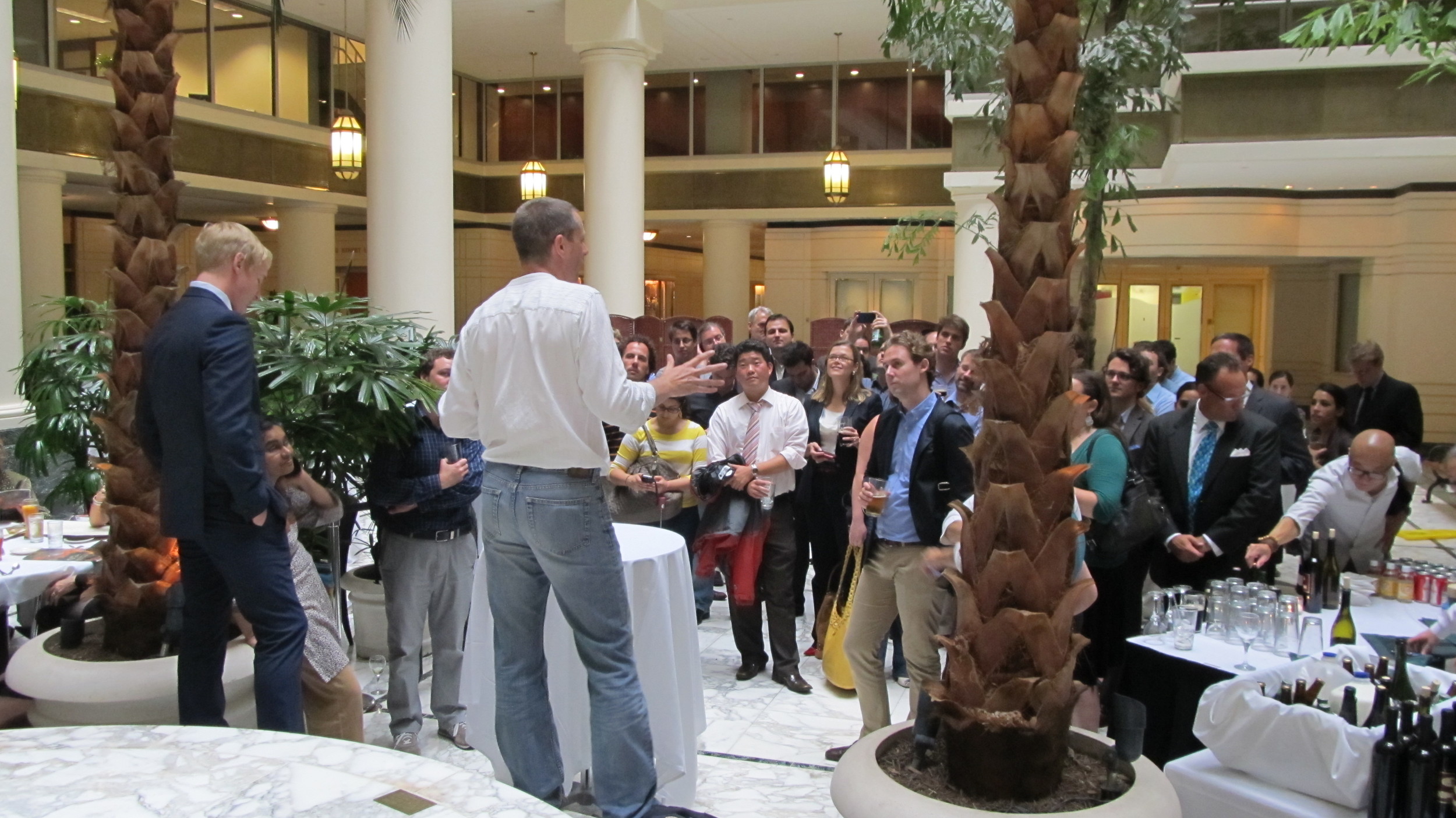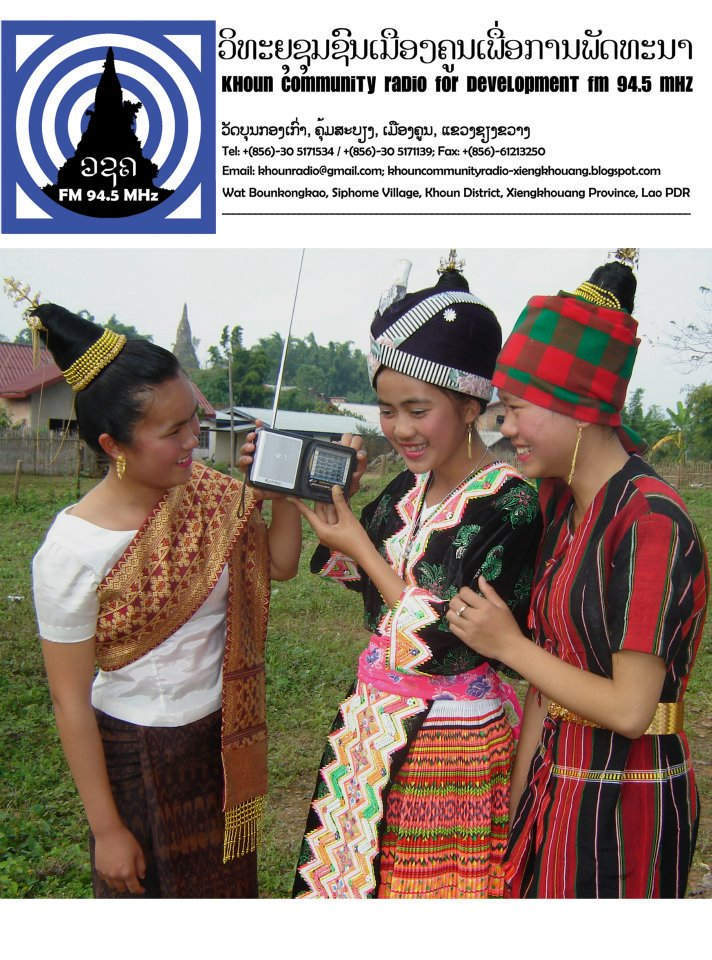Event Organizers of the London Feedback Summit used Frontline to collect and analyze survey responses and opinion data in real-time during for each session throughout the event.
Celebrating the History of FrontlineSMS
Last week was an historic one for FrontlineSMS, as we launched Version 2 with successful events in Nairobi and Washington, D.C. FrontlineSMS has come a long way since October 2005, when our founder Ken Banks launched the very first open-source SMS management software. In a blog post last week, Ken shared Seventeen things you might not know about FrontlineSMS. Inspired by Ken's post, here is a history of FrontlineSMS in nine bullet points, ahead of our global Version 2 launch event in London this evening.
- In 2005, FrontlineSMS.com is registered on 6th March, and the beta is released in October. On 5th October, 2005, to celebrate its imminent launch, FrontlineSMS buys up 200 pixels on the Million Dollar Homepage, a site which has since gone down in Internet folklore. (Read more on this here).
- 15th November, 2005: We receive an email enquiry from Kubatana, a Zimbabwean civil society organization. Days later FrontlineSMS has its first official implementation. Kubatana still use FrontlineSMS today.
- In 2006, FrontlineSMS begins receiving donor support and fellowship and the following year, the kiwanja Foundation is created to house the growing project.
- In 2008, FrontlineSMS becomes open-source. Josh Nesbit begins working with FrontlineSMS, working intensively with a clinic in Malawi to apply FrontlineSMS to the management and patient care challenges they face, significantly increasing the number of patients seen by health workers, while saving time and money. This narrative, coupled with the work and advocacy that Ken was doing, drives FrontlineSMS adoption and usage considerably.
- In 2009, our Lead Developer Alex joins us – and we began to measure software downloads and build a sector-specific brand with FrontlineSMS:Medic (which has since become Medic Mobile). We win a Silicon Valley Tech Award, and secure funding from OSI, the Hewlett Foundation and the Rockefeller Foundation. By the end of 2009, FrontlineSMS has been downloaded 4,605 times.
- In 2010, FrontlineSMS adds FrontlineSMS:Credit, FrontlineSMS:Learn, FrontlineSMS:Legal and FrontlineSMS:Radio. Our Founder, Ken Banks, is named a National Geographic Emerging Explorer. The Omidyar Network makes us one of their grantees. By the end of 2010, FrontlineSMS has been downloaded 12,395 times.
- In 2011, in response to requests for project support and consulting work, we open a social enterprise which will ultimately support the work of the Foundation and support a different group of users, as well as provide support and technical expertise to specific sectors. During this year, we win the Curry Stone Design Award for social design pioneers and are runners up for the Buckminster Fuller Sustainable Design Award. We receive funding from the Knight Foundation and renew our relationship with the Hewlett Foundation. In 2011, Ken becomes an Ashoka Fellow and wins the Pizzigati Prize for software in the public interest.
- As of December 2011, FrontlineSMS, without having released any new software since summer 2010, has been downloaded over 20,000 times. That number soon grows to over 25,000.
- In 2012 we’ve already released two open beta releases - PaymentView and FrontlineSMS:Learn - and Version 2. Later this year, you’ll see FrontlineSMS:Radio and the early prototype of a web-based version of FrontlineSMS. The FrontlineSMS team has grown from 5 in 2010 to 17 now over three continents. FrontlineSMS has users in over 80 countries across 20 different non-profit sectors, and over 25,000 downloads. The rest – as they say – is history… o/
Celebrating the Power of Radio All Over the World
By Amy O'Donnell, FrontlineSMS:Radio Project Manager.

Excitement is rising as we gear up to celebrate UNESCO’s inaugural World Radio Day next Monday 13th February. A wide spectrum of activities is being organized around the globe to raise awareness about the power of radio and to celebrate over 100 years of broadcast. For our part, FrontlineSMS:Radio is delighted to be co-organizing an event at London’s School of Oriental and African Studies (UK) with SOAS Radio, Lifeline Energy and Empowerhouse.
I am really looking forward to joining experts in the field, including Guy Berger, the Director for Freedom of Expression and Media Development at UNESCO, on the London-based panel entitled “New Perspectives on Traditional Radio.” It’s great to see the diversity of practitioners, academics and tools providers who have already signed up to join us in discussions about the importance of radio.
One theme of the event will be the way that different technologies can serve to change the way in which radio is used as a platform for engagement. For example, the innovative use of different tools is now having a revolutionary impact on the way that audiences are able to interact with programming. As I found out when I recently visited a radio station in the UK, input from social media like Google+, Twitter or Facebook allows audiences to shape the direction of programming and presenters often read out comments on-air.
But, I can’t help but ask: how are people who are offline able to engage in discussions on the radio which affect them? 2011 ended with almost 6 billion active mobile subscriptions (source: ITU, 2011 Report), and through my work at FrontlineSMS:Radio, I’ve seen that SMS is increasingly being used by radio stations across the world to facilitate two-way communication with listeners. In a "Twitter like" way - radio combined with text messaging can be a platform for community discussion which can lead to tangible changes in people's lives. This might be challenging water cartels, identifying diseases affecting livestock or crowd-sourcing opinion on service delivery.
FrontlineSMS:Radio is a customized version of FrontlineSMS which has been designed with audience participation in mind. It assists radio stations to engage more effectively with their listeners via SMS and represent their views over the airwaves. Meanwhile, the software empowers stations to gather information about their audience to enable them to be more responsive, stimulate dialogue and produce locally relevant content.
The timing of World Radio Day couldn’t be more perfect as the trial of FrontlineSMS:Radio enters an exciting phase. One station in Kenya has received over 16,000 messages into the new software in just 3 months! In the last few weeks we have opened the trial to a wider group of stations and we have started to receive their feedback and ideas to further improve the software. If you’re able to join us in London, we’ll be demonstrating a sneak peek of FrontlineSMS:Radio.
Meanwhile, many other innovative advancements are affecting the way that radio programming is produced and listened to. For example, Sourcefabric’s Airtime is free, open source radio automation software which lets radio DJs take total control of their station via the Internet. On the listeners’ end, Lifeline Energy provides solar and wind-up prime radios and Lifeplayer MP3s which are designed for large group listening. It is innovations such as these which conversations on 13th February will serve to highlight.
There seems to be a buzz of activity this week, as the finishing touches are made to different international events on the theme of radio- you can check them out on Lifeline Energy’s map which really gives the feel of a global movement. You’ll notice that discussions are happening from Dhaka to Canberra, Chipata to Lahore, Barcelona to Fiji... the list goes on. It’s also a double celebration as Airtime celebrate their first year anniversary and are holding meet ups in Berlin, Prague, Minsk, Guatemala City, Warsaw and Toronto. Let us know if you’re organizing something which you want to be added to the map! We wish everyone involved in World Radio Day 2012 the best and hope this year marks the start of bigger and better events to come!
For more on the London event, see http://worldradiodaylondon.eventbrite.com/ and the speakers' biographies. The event will be streamed from the SOAS website.
Follow us on Twitter @worldradioday or use the hashtag #worldradioday
Find us on Facebook http://www.facebook.com/WorldRadioDay
If you’re interested in getting more involved in organizing events in the future or staying up to date with content and activities from the day, join our Google group.
The Importance of Collaboration in Open Source Communities: FrontlineSMS and Ushahidi Event
By Florence Scialom, FrontlineSMS Community Support Coordinator

On the evening of Monday 7th November, FrontlineSMS co-hosted an event with Ushahidi called 'SMS to Map - Using FrontlineSMS and Ushahidi to tell your story' (#SMSmap for all those on Twitter). This event turned out to be an inspiring demonstration of the enthusiasm people have about using open source technology for social change. Held in both the UK and Kenya on the same evening, the event provided an excellent opportunity for FrontlineSMS and Ushahidi to share ideas with both new and familiar audiences. Hopefully this will be the beginning of new projects, collaborations and, ultimately, this will feed into new resources that can help our community of users too!
The ‘SMS to Map’ event was a global affair; kicking off at the iHub in Nairobi, Kenya, and later in the evening continued in London at Goldsmiths University. Both events heard presentations from FrontlineSMS and Ushahidi, as well as from community experts who have used these tools together in action for social change projects in various different countries and contexts across the world.
Speakers shared examples of a variety of different projects which had integrated FrontlineSMS and Ushahidi software, including the monitoring 2011 elections in Nigeria and mapping of harassment on the street of Egypt. Linda Raftree, of Plan International, did an excellent presentation to the London audience about a project which tracks incidences of violence against children in Benin using FrontlineSMS and Ushahidi. Also at London's event Claire Wardle, who works with the BBC College of Journalism, engaged the audience by talking about her experience of using Ushahidi for mapping the UK tube strikes. Claire’s presentation helped to demonstrate the potential utility of tools such as Ushahidi and FrontlineSMS to be used in a many different contexts you wouldn’t immediately expect.
In Nairobi, the audience heard from some of the FrontlineSMS and Ushahidi staff based there, as well as from Anahi Ayala Iacucci of the Internews Network, who has used FrontlineSMS and Ushahidi together and trained on integrating the tools. Nairobi's event also had a live tech demo showing how to synch the two software tools which had some last minute technical difficulties - as live demos always tend to! - but nonetheless worked successfully in the end and allowed the audience to learn some practical tech skills.
Overall, the 'SMS to Map' events in both London and Nairobi provided a way for people to learn more about both FrontlineSMS and Ushahidi software, and encouraged people to think about the ways they could use these software tools for social change in their own work. Through facilitating this event, we hope to build on existing collaborations and inspire more future uses of FrontlineSMS and Ushahidi together. If you are using FrontlineSMS and Ushahidi together and would like to share your use case with us, and / or suggest resources you would find useful please contact florence@frontlinesms.com and / or hleson@ushahidi.com.
You can check out some content from the ‘SMS to Map’ event below.
The live blog stream from the #SMSmap event, produced using ScribbleLive.
Pictures of the #SMSmap event on our Flickr site.
You Tube video of Laura Walker Hudson and Heather Leson welcoming people to Nairobi's 'SMS to Map' via video, and explaining the importance the collaboration between open source software providers:
I would like to take this opportunity to give huge thanks to all those involved in helping us with the FrontlineSMS and Ushahidi 'SMS to Map' event. A special thanks goes to Cast London at Goldsmiths University for sponsoring the London-based event and to the iHub for hosting the Nairobi-based event too. We could not have held these events without their kind support.
I would also like to thank the many individuals who helped make the events happen including Anahi Ayala Iacucci (Internews Network) and Hamilton Juma aka Tosh (iHub Community Manager) for their excellent hosting of the iHub event, Dan Mcquillan (Goldsmiths) for his amazing support arranging the London event, and all of the FrontlineSMS & Ushahidi staff and volunteers who helped out.
And of course all of the wonderful speakers including Linda Raftree (Plan International), Claire Wardle (BBC College of Journalism), Linda Kamau (Ushahidi), Sharon Langevin (FrontlineSMS:Credit), Limo Taboi (Ushahidi), Anahi Ayala Iacucci (Internews Network), Heather Leson (Ushahidi Director of Community) and last but not least Laura Walker Hudson (FrontlineSMS Director of Operations). Many others were involved but I don't have space to mention them all here, so just a huge thanks to everyone else who contributed!






